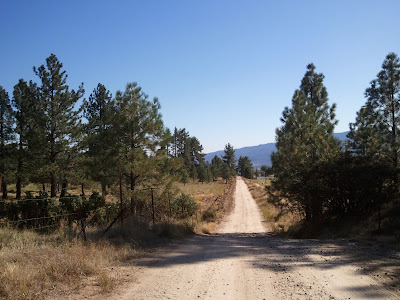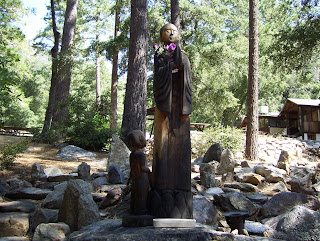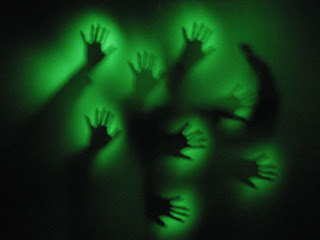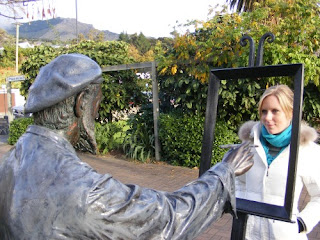 |
| The Path - actually the road to the retreat center. |
 |
| Helen as tiny snow angel |
But something else. She also puts me back in the role of Mom. Remember Martha-Lou, the Voice Dialogue lady, advising me to find time every day to let myself cry? This is hard to do when you are being Mom. I don't care how old or mature your child is, it is surely disturbing to hear your mother say, "Excuse me, dear, I have to go cry now." So, I didn't.
| Michele, my Australian cousin |
Helen's arrival closely followed by my cousin's was surely no accident. This cousin is a middle child in a family of eight. Her father is my mother's brother, who was as terrifying to his children growing up as my mother was to my sister and me. My cousin took a different tack. Instead of becoming a people pleaser and an all round good girl, she rebelled. At 17, she decided she had had enough of being quiet and shy and set out to change herself. A little younger than I, she has become quite fearless, traveling the world by herself, independent and comfortable in her own skin. She is blunt and direct, fiercely proud of her wrinkles ("I earned every one of them and I don't want anyone telling me I look younger than my age. I am proud of my age and how far I've come!"), a sort of warrior woman, and just who I needed to come visit at a time when I'm feeling a little precarious. Her blood is in me, after all. But here's what she taught me. Sunday morning and I was torn between conflicting duties: my regular Sunday at Long Beach Meditation, checking in the beginners for the new series of meditation classes; and my cousin on a once in a lifetime trip to America; and Helen 's visit. I was agonizing over this until Michele said mildly, "Why not do what you want to do." Her words stopped me short. I have a choice? I can do what I want? An idea so rare it brought tears to my eyes. In the end, I checked in the beginners but chose not to stay, Helen went for a bike ride with her Dad, and Michele and I went whale watching, spending a splendid afternoon sighting hundreds of dolphins and many blue whales.
 |
| Yokoji, the Zen monastery that was our retreat center |
| Victor walking down from his cabin, being greeted by one of the resident dogs. |
| The beautiful butterfly wing |
A second, related theme of the weekend was, do we take refuge in awareness or in the personality? The whole thrust of our being is to take refuge in the personality, in the self. We say, "That's just the way I am. That's me!" Yet the self is impermanent, thoughts are fleeting, emotions too. Ajahn Sumedho, the wonderful American Buddhist monk whom we are studying on Wednesday nights says,
"The mood comes and goes. It changes, revolves; it's happy, sad, elated, depressed, inspired, bored, loving, hateful, and on and on like this. According to the conditions that come together at this point, then the mood is this way. It's so easy to say, "Oh, I'm in a bad mood" or "I'm in a good mood." Our language is like that, so we become the mood. "I feel happy today, everything's fine" or "Today is one of my bad days." That's why I encourage this investigation of thought, so that you're not creating yourself, endlessly reinforcing the sense of a self through your proliferating thoughts."
p. 230, The Sound of Silence
 |
| Picnic tables on the right |
| Victor sitting in front of the altars, big and little |
"The empty mind cannot be purchased at the altar of demand; it comes into being when thought is aware of its own activities - not the thinker being aware of his thought."
J. Krishnamurti,
Only Revolution California Part 3
"When thought is aware of its own activities..." that would be us! WE are thought, the thinker IS thought. Not simply being aware of our thoughts, "Oh, that's just a thought!" But that which is thinking, "Oh, that's just a thought!" is itself a thought! The empty mind is the mind that realizes this. Hard to do, you're - er - thinking. Well, yes. From the standpoint of the ego, impossible. Because the ego is the part that thinks. Awareness - that which we truly are - does not think. It reflects. It mirrors back what is. But we have allowed the thinking mind to take over to such an extent, our sliver of pure awareness is almost lost. And this is why we must work so hard at something that is probably quite simple: being quiet and still in the mind. Being with what is, moment to moment, without reference to thought, to memories past, or expectations for the future. When you sit for any amount of time and try to stay in the present moment, you immediately see how difficult this is. As Victor has noted, the mind has a tremendous resistance to staying in the present. It has nothing to do. And if it has nothing to do, it catches a whiff of its own mortality and it panics. Who am I, without thought? Incessant thought, that critical voice in the head that endlessly comments and judges and compares and analyzes. Whatever else it is, it feed us the illusion that we are not alone. Stephen King, master of horror, said, "Alone. Yes, that's the key word, the most awful word in the English tongue. Murder doesn't hold a candle to it and hell is only a poor synonym."
The thinking mind is robotic, mechanical. You can argue that it's not, but the proof for me was when I was doing The Artist's Way, writing three pages every morning without fail for twelve weeks straight. In the ninth week we were instructed to go back and reread what we had written. And what a shocker to find that certain thoughts played out compulsively over and over again, each time written as if I'd never had that thought before. In fact I would have sworn it was brand new. Yet here was the proof. Pages and pages of repeats. The Voice Dialogue work shed a little light on that: maybe the thought seemed new because each time a new persona was thinking it, and since they have no interest in speaking to each other, don't want to know each other's thoughts, then perhaps for that one it is in fact a new thought. (I don't know if this is true. It's just a thought!)
So for me the galvanizing thing Friday night was when Victor told us this: "Imagine that you have just been given a spiritual book. One that you have searched for, longed to read for years, and at last, in this very beautiful library, the book is placed in your hands." He continued, "Wouldn't you read every word, every page, of that book with interest and curiosity? Now..." (drumroll) "...imagine that you are that rare book. You must learn to read yourself, your thoughts, your mind, with equal interest and curiosity."
 |
| "Know thyself" |
So I was thinking, if awareness is a mirror, it is reflected through the self. Each of us has our own unique self through which to reflect back out into the world this awareness, which in fact we share with every living thing. Call it energy, if you like. You can have bright energy, high energy, low energy. Your job then is to polish your mirror, your self, so that what you reflect back into the world is bright and clear-seeing. So yes to therapy, to self-examination. Chogyam Trungpa spoke of spiritual bypassing - how much easier it would be, to just hurtle over the murky bits of the self and get straight to the calm sitting. But it doesn't work like that. The things you do not face simply go underground; they do not disappear. Maybe you will be able to tiptoe through life avoiding the thing that will trigger you - but since you are likely unaware there even is a trigger, how do you know what to avoid? Until the unfortunate day when that buried aspect of yourself comes roaring out, to everyone's surprise, but mostly your own.
All my life I have leaped over the sad bits of my life, like a super-hero leaping over tall buildings in a single bound, eager to get on with it, with life, with its seemingly continuous forward motion. I bought my family's unspoken motto, "Never look back, never go back." Now I am finding out that I must go back and revisit every dreary floor - I like the image of trudging up and down each skyscraper, in and out of all its rooms, down the corridors, the elevator shafts.
The funny thing is, after we have done the work, spent the effort reading every line of our one book, it seems we will find that the book wasn't the thing at all. After all, it is one book among billions, a single volume in that library containing a copy of every book ever written. So what? Is it the library, is that it? The container of all those individual stories? As the ocean is to the little wavelets on its surface, each wave unique yet part of the whole? So what's the point of reading our own story so carefully? Is it to discover the commonality of our stories? If I plumb my own depths, will it increase my compassion for others? There are only so many plots after all...
Talk about "proliferating thoughts."
I had an interview with Victor the following morning, still brimming with excitement over these ideas. We sat outside at a picnic table. I told him how much I loved the idea of reading the book in the library. Mildly, he pointed out the fatal flaw - "WHO is reading the book?" Aaaargh. He added, "Why does there have to be anyone reading the book? It is being read." So imagine that. There is nothing to do, nothing to be. It just is. Hard to fathom this! I love words, I love analyzing and yes, thinking. And analyzing and thinking provide a good cover for not doing the actual work. HH tells me the same thing. So often I will plunge into an intellectual discussion, while he keeps trying to bring me back to feeling, as in, "What are you feeling right now?" Most of the time, I haven't a clue or don't want to know. Who wants to be sad? I'd rather live in my head.
So here I am on retreat, thought firing on all cylinders, and Victor is warning me that the mind is very clever, it can find connections between anything. My clever mind is busy doing just that. I can spin a good story about investigating elevator shafts, but in fact I am back to my old trick of leaping over the tall buildings, aka messy emotions, flying high on pure thought.
Meanwhile, something else is going on. I noticed during the first full day, Friday, whenever I was feeling particularly upbeat and happy, for instance during the little story of the butterfly wing, there would follow a tearful interlude. Nothing dramatic, just a little drip of cold tears. They weren't even accompanied by great physical sensations, no tightening in the throat or heaviness in the chest, just a steady drip of tears. In the restroom below the zendo was a little card tacked to the wall - "In case of cold weather, please don't turn the tap off completely." I knew enough about cold climates to know the dangers of pipes bursting from frozen water expanding. I thought the stream of my cold tears was analogous to relieving pressure in the pipes. I thought to myself that this was the little girl from Voice Dialogue, the one who holds the sorrow, feeling safe enough to show her face and gently weep. It was all very calm and measured and actually rather pleasant.
Somehow I lost control. I wish I could tell you how it happened. And why. It would be nice to be so aware I could pinpoint the exact thought that set me off. But truth is, I can't say for certain what happened. By Saturday afternoon, the sorrow was growing, the tears less polite, the sensations in the body becoming unbearable, until I knew that sooner or later I was going to break down. I thought yoga wold help - it usually does - but when I found tears sliding into my ears while lying in savasana, I knew meltdown was impossible to avoid. The very next sit, the one right after yoga which is usually the best one as far as I'm concerned, the pipes burst. Luckily I remembered that at Goenka they would escort you outside not just for laughter (as I knew firsthand), but also for sobbing. In both cases, the sounds and emotions can infect others. So when I felt an unstoppable "ugly cry" arising, I got up from my seat and with a panicked glance at Victor and a vague wave at my face, fled the zendo.
 |
| My room, there's my bed right by the door. |
 |
| My favorite Buddha |
 |
| Big yellow comforting dog |
| Tran hugging me in the silence |
When I finally did get to bed, I could hardly sleep and next morning I was up and dressed in the dark and in the zendo by 5. Someone was doing yoga stretches at one end of the room and I wrote in my notebook at the other. I wrote about the night before, all those tears, that there was no reason. And that it's all thought, isn't it? Anything I write is a thought. A thought put into words. If it can be put into words, it's a creation. Was it that idea - that we are thoughts - that on some level is so bleak? But that thought is itself a thought. How the mind can occupy itself, going round and round in thought.
We are not vegetables if we don't think. I think that is the fear. (My fear. One of them.) There is much beyond thought, beyond the descriptive power of words.
For instance, the words to the left, by Brian Andreas, read:
"I read once that the ancient Egyptians had fifty words for sand and the Eskimos had a hundred words for snow. I wish I had a thousand words for love, but all that comes to mind is the way you move against me while you sleep and there are no words for that."
"There are no words for that." Yet we "know" just what he means. When I speak of the comfort in Wendy's hand rubbing my back, or Tran's strong embrace, you can imagine how it felt. Words are the signpost to something beyond thought. But we've invested thought with such importance that now we must go through contortions to turn ourselves off. I do realize the hand, the embrace, the sense of touch, are still creations, still "things" arising from the senses, from this conditioned realm. But we start where we are, and here is where I am. I imagine pure awareness is that empty stage and all the little selves quiet. Nobody wanting anything from anyone. And there. Silence. Of course in the imagining, I conjure up another creation...
Life is not linear after all, but a spiral. These reflections are not very different from last year's retreat reflections. Then I wrote after that crying jag:
"My little girl, felt in the tight heart of the night before, was the one who was shattered. After spending an entire, excruciating year clawing her way into the light, now she is dismissed, and told she is "only a thought?" Oh no! This was a plunge back into darkest pit."
Ajahn Sumedho again, "When the self starts to break up, some people find that it becomes very frightening, because everything you have regarded as solid and real starts falling apart." What's different is that each go round, it seems what I thought I understood, I only understood intellectually. It has to be experienced in the body. As Victor wrote a year ago, "There is no path that skirts your crying, Alison." I didn't understand that then. Perhaps I couldn't. Not sure I fully understand it now, it runs counter to years and years of programming and change is not easy. And now I have come full circle: this is where I began, trying to break the old patterns. The retreat showed just what a monumental task that is.
When we were no longer in Noble Silence on Sunday, I told Wendy I think we live our lives from the tip of the iceberg. And we haven't a clue what's going on below. Hardly an original thought but I understood it in my bones. Also that I felt as if I never needed to overeat again. That lasted until the next meal, but at the time it felt like I no longer needed a padding of fat to cushion life's edges. I did feel lighter, as if all those tears had shucked off a great swathe of old sorrow. How, why, to what purpose or for how long, who knows. My aunt, my mother's sister, says I am reclaiming my childhood, my self. We will see where it goes. If I say I have a destination, I am looking for a certain outcome, I am setting up expectations and am no longer open to what is. So we shall have to see.
And probably at our next retreat, I will spiral around once more to these same reflections and I will cry and be shocked and write about them as if they were brand new. But hopefully I'll expose a little more of the iceberg. (What did I just say about setting expectations?!)
Victor read us more from Krishnamurti on Saturday night:
"The sky is very blue, the blue that comes after the rain, and these rains have come after many months of drought. After the rain the skies are washed clean and the hills are rejoicing, and the earth is still. And every leaf has the light of the sun on it, and the feeling of the earth is very close to you. So meditate in the very secret recesses of your heart and mind, where you have never been before."
In my next blog, I will explore that sad little girl who lives in "the very secret recesses" of heart and mind and see what she has to say.








